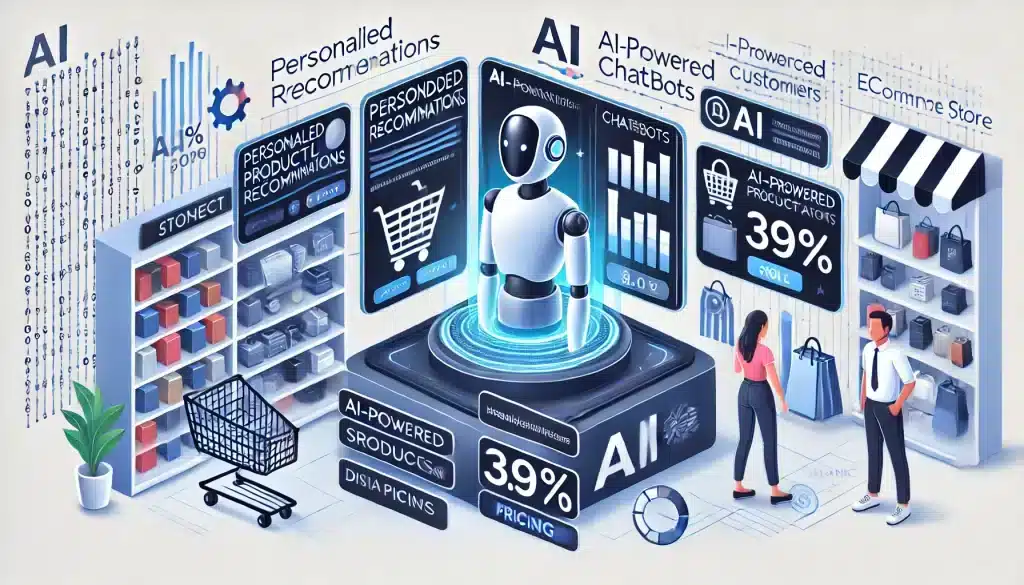Introduction
In the rapidly evolving landscape of business technology, artificial intelligence (AI) has emerged as a transformative force across industries. Nowhere is this impact more pronounced than in sales, where AI is revolutionizing how organizations interact with customers, manage data, and achieve growth. For businesses striving to stay competitive, leveraging AI to enhance their sales processes has become not just a strategic advantage but a necessity.
AI’s ability to analyze vast amounts of data, identify patterns, and generate actionable insights is reshaping the way sales teams operate. By automating repetitive tasks, enabling real-time decision-making, and offering predictive analytics, AI empowers sales teams to work smarter, not harder. Whether it’s improving lead scoring, optimizing sales calls, or delivering personalized customer experiences, AI is setting new standards for efficiency and effectiveness in sales operations.
This guide delves into the transformative role of AI in sales, exploring its applications, benefits, and best practices for implementation. By understanding how AI can be strategically integrated into sales processes, businesses can unlock unprecedented opportunities for growth and customer engagement.
What is AI and How is it Revolutionizing Sales?
Defining Artificial Intelligence in Sales
AI in sales refers to the application of advanced AI technologies to assist and enhance the sales process. From customer relationship management (CRM) systems enriched with AI capabilities to predictive analytics platforms, AI can analyze vast amounts of sales data and provide actionable insights. Sales teams can use artificial intelligence to better understand customer behavior, optimize their sales pitches, and make data-driven decisions that improve overall sales performance.
The Role of Machine Learning in Modern Sales
Machine learning, a subset of AI, plays a crucial role in the sales landscape by enabling systems to learn from data and refine their predictions over time. By employing machine learning algorithms, businesses can automate repetitive sales tasks such as lead scoring, sales forecasting, and customer segmentation. This automation not only boosts efficiency but also allows sales reps to focus on more strategic activities that drive revenue. Therefore, the integration of AI and machine learning in sales represents a significant leap toward more intelligent and responsive sales operations.
The Promise of Generative AI for Sales Processes
Generative AI is another pioneering technology making waves in the sales arena. Unlike traditional AI, which primarily analyzes existing data, generative AI can also create new content and solutions, thereby offering innovative ways to engage with customers. For example, generative AI tools can craft personalized marketing messages, develop creative sales pitches, and simulate extensive sales scenarios to prepare sales professionals better. The promise of generative AI lies in its ability to provide tailored, high-quality content that resonates deeply with different customer segments.

How Can Sales Teams Use AI for Improved Performance?
Leveraging AI for Sales Forecasting
Accurate sales forecasting is vital for any sales organization, and AI technologies significantly enhance the accuracy of these predictions. By leveraging historical sales data and various market indicators, AI tools can forecast future sales trends with high precision. Sales managers can use these insights to make informed decisions regarding resource allocation, strategic planning, and performance targets. Furthermore, AI-driven forecasting models can identify patterns and anomalies that human analysts might overlook, thus providing a more comprehensive view of potential sales outcomes.
AI Tools for Enhancing Sales Calls
AI can also revolutionize the way sales calls are conducted. Conversational AI tools, equipped with natural language processing capabilities, can transcribe and analyze sales calls in real time. This analysis provides immediate feedback to sales reps, highlighting areas for improvement and suggesting strategies to better engage customers. Additionally, AI tools can identify important keywords and sentiments expressed during the call, allowing sales professionals to tailor their responses accordingly. The use of AI in sales calls ensures that every interaction is more effective and personalized, thereby increasing the likelihood of closing deals.
Sentiment Analysis: Understanding Customer Emotions
Understanding customer emotions is crucial for building strong relationships and converting leads into loyal clients. Sentiment analysis, powered by AI, can help sales teams gauge the emotional tone of customer interactions. By analyzing text, voice, or social media content, AI can detect whether a customer is satisfied, frustrated, or indifferent. This information enables sales reps to adjust their strategies in real time, ensuring a more empathetic and effective response. In essence, sentiment analysis adds a layer of emotional intelligence to the sales process, which can significantly improve customer satisfaction and retention.
What AI Tools are Essential for Sales Operations?
Popular AI Tools in Sales and Marketing
Several AI tools have become indispensable in the realms of sales and marketing. Platforms like Salesforce Einstein, HubSpot, and Zoho CRM offer AI-powered features that assist with lead generation, customer engagement, and data analysis. These tools integrate seamlessly with existing sales technologies, providing enhanced functionalities such as predictive analytics, automated follow-ups, and personalized recommendations. In B2B sales, using AI tools can streamline complex sales processes and improve overall efficiency. Therefore, investing in robust AI sales tools is crucial for any sales organization aiming to stay competitive in today’s market.
AI Sales Tools for Automation
Sales automation is another critical area where AI excels. AI sales tools can automate various sales activities, including email marketing, social media outreach, and routine follow-ups. This automation frees up time for sales reps, allowing them to concentrate on high-value tasks such as client meetings and strategic planning. Moreover, AI-driven automation ensures consistency and accuracy in executing sales tasks, reducing the likelihood of human error. By leveraging AI for sales automation, businesses can achieve higher productivity, better customer engagement, and ultimately, improved sales outcomes.
AI for Sales and Its Impact on Sales Reps
The integration of AI in sales workflows can profoundly impact how sales reps operate. AI provides them with timely insights, predictive analytics, and real-time assistance, making their jobs more efficient and effective. For instance, AI can recommend the best times to contact prospects, suggest the most persuasive arguments, and even draft compelling proposals. This kind of support transforms the role of sales reps from mere executors of tasks to strategic decision-makers. Thus, embracing AI in sales can significantly enhance the capabilities of sales professionals and drive better results for the organization.
What are the Key Use Cases of AI in Sales?
Sales Use Cases Demonstrating AI Efficiency
AI has demonstrated its efficiency in various sales use cases, including lead scoring, customer segmentation, and targeted marketing. For example, AI can analyze an extensive range of data points to score leads based on their likelihood to convert, enabling sales teams to prioritize high-potential prospects. Similarly, AI can segment customers into distinct groups based on behavior, preferences, and needs, allowing for more personalized marketing campaigns. These use cases highlight how AI’s analytical power can streamline sales processes and boost conversion rates.
AI’s Role in Shortening the Sales Cycle
One of the significant benefits of incorporating AI into sales operations is its ability to shorten the sales cycle. By providing sales reps with actionable insights and predictive analytics, AI can accelerate the decision-making process. AI tools can also automate time-consuming tasks such as data entry and follow-ups, ensuring that sales professionals spend more time interacting with prospects and closing deals. As a result, sales cycles become shorter, and the time to revenue is reduced. This acceleration is particularly beneficial in competitive markets where speed and efficiency are critical.
Enhancing Sales Team Collaboration with AI
AI also plays a vital role in enhancing collaboration within sales teams. AI-driven platforms can facilitate better communication and information sharing among team members. For instance, AI can aggregate and analyze sales data from multiple sources, providing a unified view that all team members can access. These insights enable sales teams to align their strategies and share best practices more effectively. Moreover, AI-powered tools such as virtual assistants and chatbots can assist in coordinating tasks and scheduling meetings, further improving team collaboration and productivity.
How Can Sales Leaders Implement AI in Their Strategies?
Best Practices for AI Integration in Sales Teams
For sales leaders looking to implement AI in their strategies, several best practices can ensure a successful integration. First, it is essential to identify the specific needs and challenges of the sales team that AI can address. Next, investing in the right AI tools and technologies that align with those needs is crucial. It is also vital to involve sales reps in the process and provide them with the necessary training to use AI tools effectively. Finally, continuously monitoring and evaluating the impact of AI on sales performance can help refine strategies and maximize benefits.
Training Sales Professionals to Use AI Effectively
Training is a critical component of successfully implementing AI in sales operations. Sales professionals need to understand not only how to use AI tools but also how to interpret and act on the insights they provide. Providing comprehensive training programs, workshops, and ongoing support can help sales teams become proficient in using AI. Additionally, fostering a culture of continuous learning and encouraging sales reps to stay updated on the latest AI developments can ensure that they stay ahead of the curve and leverage AI to its full potential.
Measuring the Impact of AI on Sales Performance
Measuring the impact of AI on sales performance is essential for understanding its effectiveness and making data-driven decisions. Key performance indicators (KPIs) such as lead conversion rates, sales cycle length, revenue growth, and customer satisfaction can provide insights into how AI is impacting sales operations. Sales leaders should establish a robust framework for tracking these metrics and regularly review the data to identify areas for improvement. By continuously measuring and analyzing the impact of AI, sales organizations can optimize their strategies and achieve sustained growth.
Conclusion
AI has redefined the sales landscape, transitioning traditional practices into a data-driven, customer-centric domain. From predicting customer behavior to automating routine tasks and personalizing interactions, AI offers tools that enhance the efficiency and effectiveness of sales teams. Its ability to process and analyze data in real-time allows businesses to make informed decisions, shorten sales cycles, and build stronger customer relationships.
For sales professionals, AI is more than just a tool—it is a strategic partner that amplifies their ability to connect with customers, close deals, and achieve targets. For organizations, embracing AI in sales means gaining a competitive edge in a rapidly changing marketplace. However, successful implementation requires thoughtful integration, comprehensive training, and a commitment to continuous optimization.
As AI technology continues to evolve, its potential to transform sales will only grow. Businesses that invest in AI today are not just preparing for the future; they are actively shaping it. By leveraging AI, companies can align their sales strategies with modern customer expectations, ensuring sustained success in an increasingly competitive environment.
Frequently Asked Questions (FAQs)
Q1. What is AI in sales, and how does it benefit businesses?
A: AI in sales refers to the application of advanced technologies like machine learning and predictive analytics to enhance sales processes. It benefits businesses by automating routine tasks, improving lead scoring accuracy, providing real-time insights, and enabling personalized customer interactions, ultimately boosting sales performance and efficiency.
Q2. How does AI improve sales forecasting?
A: AI enhances sales forecasting by analyzing historical sales data, market trends, and customer behavior patterns to predict future sales outcomes with high precision. This allows businesses to plan better, allocate resources effectively, and set realistic performance targets.
Q3. What are some essential AI tools for sales teams?
A: Popular AI tools for sales include Salesforce Einstein, HubSpot, Zoho CRM, and conversational AI platforms. These tools assist with lead generation, sales forecasting, personalized marketing, and real-time customer engagement, helping sales teams optimize their efforts and improve outcomes.
Q4. How can businesses implement AI in their sales strategies?
A: Businesses can implement AI in sales by integrating AI-powered tools into their CRM systems, providing training for sales teams, and continuously monitoring AI performance. Identifying specific needs, such as lead scoring or personalized marketing, and choosing tools that address those needs is critical for successful implementation.



